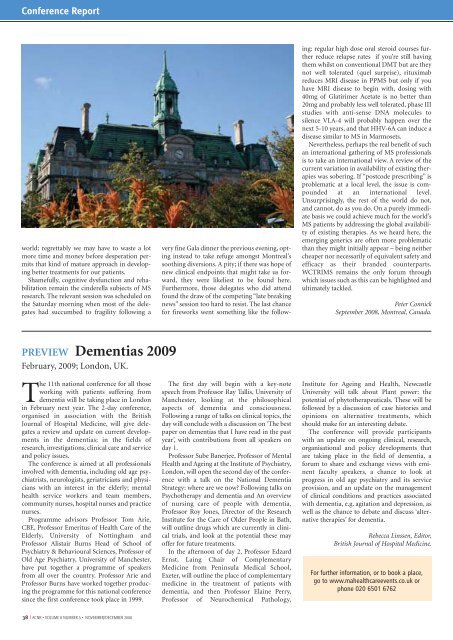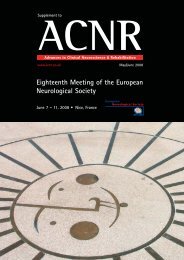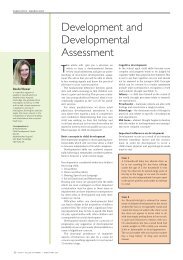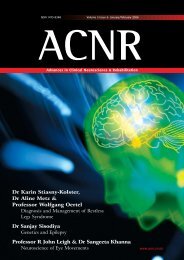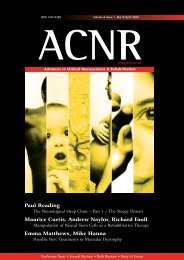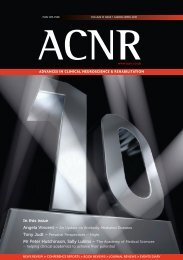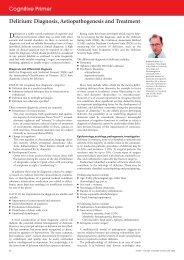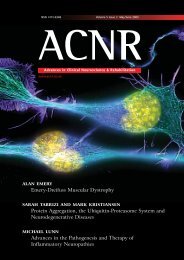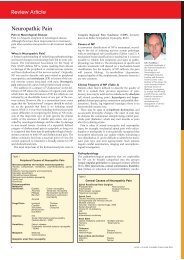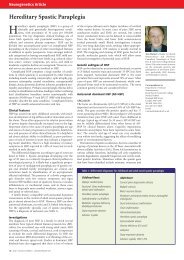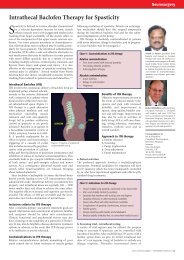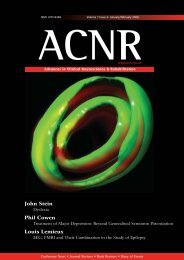Unn Ljøstad and Åse Mygland Jone Furlund Owe and Nils ... - ACNR
Unn Ljøstad and Åse Mygland Jone Furlund Owe and Nils ... - ACNR
Unn Ljøstad and Åse Mygland Jone Furlund Owe and Nils ... - ACNR
You also want an ePaper? Increase the reach of your titles
YUMPU automatically turns print PDFs into web optimized ePapers that Google loves.
Conference Report<br />
world; regrettably we may have to waste a lot<br />
more time <strong>and</strong> money before desperation permits<br />
that kind of mature approach in developing<br />
better treatments for our patients.<br />
Shamefully, cognitive dysfunction <strong>and</strong> rehabilitation<br />
remain the cinderella subjects of MS<br />
research. The relevant session was scheduled on<br />
the Saturday morning when most of the delegates<br />
had succumbed to fragility following a<br />
very fine Gala dinner the previous evening, opting<br />
instead to take refuge amongst Montreal’s<br />
soothing diversions. A pity; if there was hope of<br />
new clinical endpoints that might take us forward,<br />
they were likeliest to be found here.<br />
Furthermore, those delegates who did attend<br />
found the draw of the competing “late breaking<br />
news” session too hard to resist. The last chance<br />
for fireworks went something like the following:<br />
regular high dose oral steroid courses further<br />
reduce relapse rates if you’re still having<br />
them whilst on conventional DMT but are they<br />
not well tolerated (quel surprise), rituximab<br />
reduces MRI disease in PPMS but only if you<br />
have MRI disease to begin with, dosing with<br />
40mg of Glatirimer Acetate is no better than<br />
20mg <strong>and</strong> probably less well tolerated, phase III<br />
studies with anti-sense DNA molecules to<br />
silence VLA-4 will probably happen over the<br />
next 5-10 years, <strong>and</strong> that HHV-6A can induce a<br />
disease similar to MS in Marmosets.<br />
Nevertheless, perhaps the real benefit of such<br />
an international gathering of MS professionals<br />
is to take an international view. A review of the<br />
current variation in availability of existing therapies<br />
was sobering. If “postcode prescribing” is<br />
problematic at a local level, the issue is compounded<br />
at an international level.<br />
Unsurprisingly, the rest of the world do not,<br />
<strong>and</strong> cannot, do as you do. On a purely immediate<br />
basis we could achieve much for the world’s<br />
MS patients by addressing the global availability<br />
of existing therapies. As we heard here, the<br />
emerging generics are often more problematic<br />
than they might initially appear – being neither<br />
cheaper nor necessarily of equivalent safety <strong>and</strong><br />
efficacy as their br<strong>and</strong>ed counterparts.<br />
WCTRIMS remains the only forum through<br />
which issues such as this can be highlighted <strong>and</strong><br />
ultimately tackled.<br />
Peter Connick<br />
September 2008, Montreal, Canada.<br />
PREVIEW Dementias 2009<br />
February, 2009; London, UK.<br />
The 11th national conference for all those<br />
working with patients suffering from<br />
dementia will be taking place in London<br />
in February next year. The 2-day conference,<br />
organised in association with the British<br />
Journal of Hospital Medicine, will give delegates<br />
a review <strong>and</strong> update on current developments<br />
in the dementias; in the fields of<br />
research, investigations, clinical care <strong>and</strong> service<br />
<strong>and</strong> policy issues.<br />
The conference is aimed at all professionals<br />
involved with dementia, including old age psychiatrists,<br />
neurologists, geriatricians <strong>and</strong> physicians<br />
with an interest in the elderly; mental<br />
health service workers <strong>and</strong> team members,<br />
community nurses, hospital nurses <strong>and</strong> practice<br />
nurses.<br />
Programme advisors Professor Tom Arie,<br />
CBE, Professor Emeritus of Health Care of the<br />
Elderly, University of Nottingham <strong>and</strong><br />
Professor Alistair Burns Head of School of<br />
Psychiatry & Behavioural Sciences, Professor of<br />
Old Age Psychiatry, University of Manchester,<br />
have put together a programme of speakers<br />
from all over the country. Professor Arie <strong>and</strong><br />
Professor Burns have worked together producing<br />
the programme for this national conference<br />
since the first conference took place in 1999.<br />
The first day will begin with a key-note<br />
speech from Professor Ray Tallis, University of<br />
Manchester, looking at the philosophical<br />
aspects of dementia <strong>and</strong> consciousness.<br />
Following a range of talks on clinical topics, the<br />
day will conclude with a discussion on ‘The best<br />
paper on dementias that I have read in the past<br />
year’, with contributions from all speakers on<br />
day 1.<br />
Professor Sube Banerjee, Professor of Mental<br />
Health <strong>and</strong> Ageing at the Institute of Psychiatry,<br />
London, will open the second day of the conference<br />
with a talk on the National Dementia<br />
Strategy: where are we now? Following talks on<br />
Psychotherapy <strong>and</strong> dementia <strong>and</strong> An overview<br />
of nursing care of people with dementia,<br />
Professor Roy <strong>Jone</strong>s, Director of the Research<br />
Institute for the Care of Older People in Bath,<br />
will outline drugs which are currently in clinical<br />
trials, <strong>and</strong> look at the potential these may<br />
offer for future treatments.<br />
In the afternoon of day 2, Professor Edzard<br />
Ernst, Laing Chair of Complementary<br />
Medicine from Peninsula Medical School,<br />
Exeter, will outline the place of complementary<br />
medicine in the treatment of patients with<br />
dementia, <strong>and</strong> then Professor Elaine Perry,<br />
Professor of Neurochemical Pathology,<br />
Institute for Ageing <strong>and</strong> Health, Newcastle<br />
University will talk about Plant power: the<br />
potential of phytotherapeuticals. These will be<br />
followed by a discussion of case histories <strong>and</strong><br />
opinions on alternative treatments, which<br />
should make for an interesting debate.<br />
The conference will provide participants<br />
with an update on ongoing clinical, research,<br />
organisational <strong>and</strong> policy developments that<br />
are taking place in the field of dementia, a<br />
forum to share <strong>and</strong> exchange views with eminent<br />
faculty speakers, a chance to look at<br />
progress in old age psychiatry <strong>and</strong> its service<br />
provision, <strong>and</strong> an update on the management<br />
of clinical conditions <strong>and</strong> practices associated<br />
with dementia, e.g. agitation <strong>and</strong> depression, as<br />
well as the chance to debate <strong>and</strong> discuss ‘alternative<br />
therapies’ for dementia.<br />
Rebecca Linssen, Editor,<br />
British Journal of Hospital Medicine.<br />
For further information, or to book a place,<br />
go to www.mahealthcareevents.co.uk or<br />
phone 020 6501 6762<br />
38 I <strong>ACNR</strong> • VOLUME 8 NUMBER 5 • NOVEMBER/DECEMBER 2008


